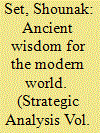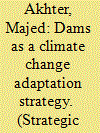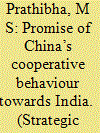|
|
|
Sort Order |
|
|
|
Items / Page
|
|
|
|
|
|
|
| Srl | Item |
| 1 |
ID:
141912


|
|
|
|
|
| Summary/Abstract |
here appear among mankind unique individuals from time to time who by the dint of their merit shape the course of history and leave their imprint on the hard altar of time. Standing tall on the obscure porch of ancient India is the enigmatic figure of Kautilya, variously referred to as Vishnugupta or Chanakya (370–283 bc approx.). While differing and contradictory accounts pertain to his origins and historicity,
|
|
|
|
|
|
|
|
|
|
|
|
|
|
|
|
| 2 |
ID:
141916


|
|
|
|
|
| Summary/Abstract |
Pakistani planners are increasingly prone to recognize the many links between water, food, and energy security. The construction of new large dams is seen by many as a concrete measure to achieve resource security for Pakistani for a future marked by climactic variability and unpredictability. This article explores the geopolitical and political geographic implications of Pakistan’s strategic vision of building dams as a way to prepare for climate change. The author argues that far from being politically neutral tools for development with predictable effects, large dams create new political and spatial arenas of conflict and contradiction at the international, regional, and local scales.
|
|
|
|
|
|
|
|
|
|
|
|
|
|
|
|
| 3 |
ID:
141914


|
|
|
|
|
| Summary/Abstract |
The standard narrative on modern geopolitics is being re-scripted. Previous ingredients that made up the literature on high politics such as securing resources, rivalries over the control of territory and war plans are increasingly being replaced instead by concerns about the ‘mundane’ politics of global energy plans, food systems, infrastructure and city design. Meaningful geopolitics in the time of climate change, in other words, would now have to grapple with the inescapable urgency for sustaining key ecological, biological and atmospheric indicators at the planetary level. If ‘planetary boundaries’ are being crossed in the Epoch of the Anthropocene, however, should governments in the global South and the developing world worry about becoming nations without borders?
|
|
|
|
|
|
|
|
|
|
|
|
|
|
|
|
| 4 |
ID:
141910


|
|
|
|
|
| Summary/Abstract |
The military and scientific leadership of Pakistan has given clear signals that tactical nuclear weapons have a vital role in Pakistan’s nuclear weapons policy. Developed to lower Pakistan’s nuclear threshold, these weapons may further deter India from launching a conventional strike to punish Pakistan for its sub-conventional war against India. This has led to a debate on the possible doctrinal responses that India could adopt to counter Pakistan’s tactical nuclear weapons. India could either make its current doctrine of massive retaliation more credible by appropriate signalling or it could revise the doctrine and develop its options of proportionate retaliation. Considering the limitations of both these options, the article argues for developing a doctrinal response that prescribes neither proportionate nor massively disproportionate retaliation.
|
|
|
|
|
|
|
|
|
|
|
|
|
|
|
|
| 5 |
ID:
141913


|
|
|
|
|
| Summary/Abstract |
India’s economic rise in the last decade has prompted China to seek greater cooperation with India. The Chinese strategy promises that India will profit from the wide-ranging economic engagement and importantly blunts any perceived support to the US in the containment of China. Clearly, for China, any ‘rebalancing’ in the Asia Pacific is upsetting and therefore India’s strategic partnerships with the United States, Japan or Vietnam are keenly observed. As a result, there is intense Chinese pressure on India to cooperate on its terms, for example China’s One Road One Belt project. China also believes that it is in an advantageous economic and military position vis-à-vis India and therefore any perceived aggression from the Indian side, such as overt strategic engagements with the US, quickly prompts China to create sub-level crises so as to weaken India’s claims to the border or create uncertainty in the minds of the leadership.
|
|
|
|
|
|
|
|
|
|
|
|
|
|
|
|
| 6 |
ID:
141911


|
|
|
|
|
| Summary/Abstract |
Sino-Indian relations were governed by concerns about an unsound bilateral bonhomie, internal as well as external strategic and political considerations, and in addition, national interests and priorities not necessarily oriented towards pacifying the bilateral relations. The change in leadership presented a golden opportunity for refiguring the India–China relationship in terms of mutual economic gains, crafting a durable framework to deal with their border dispute, marking the culmination of a great deal of proactive diplomacy and planning by both governments in a short period of time and thereby giving a new dynamism to the bilateral relationship. The sustained progress in the multifarious strategic issues such as trade deficit, border disputes and investment has eventually built trust between the two nations. This article explores how both nations have continued their efforts with a series of important cooperation initiatives in the areas of economy, culture, trade and borders to achieve peaceful cooperation and inclusive development for the benefit of two peoples in particular and in the interest of peace and stability in the world in general.
|
|
|
|
|
|
|
|
|
|
|
|
|
|
|
|
| 7 |
ID:
141909


|
|
|
|
|
| Summary/Abstract |
The Paracel Islands dispute has recently resurfaced as a source of conflict between Vietnam and China, who both claim sovereignty over the islands from ‘time immemorial’. This article re-examines their respective claims from an international law perspective. It also focuses on delineating the respective claims with emphasis on sovereignty, territory and self-determination. Based on available sources, this article suggests that Vietnam appears to have a more credible sovereignty claim over the Paracel Islands vis-à-vis China. Having thus assumed Vietnamese sovereignty, this article then sets out to explore the maritime zones that Vietnam would be entitled to under the United Nations Convention on the Law of the Sea.
|
|
|
|
|
|
|
|
|
|
|
|
|
|
|
|
| 8 |
ID:
141915


|
|
|
|
|
| Summary/Abstract |
Hydropower development clearly has a significant role to play in the closer integration of different parts of the Himalayas and in facilitating downstream benefits throughout South Asia. However, the neo-liberal approach to infrastructure-led growth frequently overlooks the significant social, economic and political issues associated with this model of development in the region. Furthermore, the ongoing securitisation of water constrains the terms of debate under the guise of a unified national interest and enables large-scale dams to be constructed without due process. To desecuritise water in the Himalayas is to open up this dialogue and in so doing create the conditions for just and sustainable development.
|
|
|
|
|
|
|
|
|
|
|
|
|
|
|
|
|
|
|
|
|